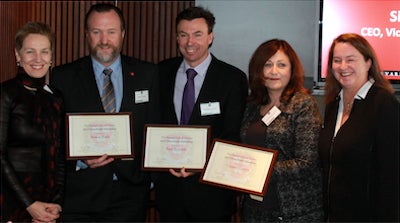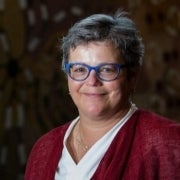According to the Harvard Impact Study, Harvard alumni collectively dedicate at least 1.6 million hours per month volunteering for public and community service efforts around the world. In celebration of these efforts, the Harvard Alumni Association (HAA) presents "Alumni Service Spotlight," a series of conversations with alumni who give of their time and talents for the betterment of their communities.
Every July for the past 17 years, the Harvard Club of Victoria has given nonprofit CEOs from the Australian state of Victoria the opportunity to study nonprofit management at Harvard Business School (HBS) without putting a strain on their organizations' budgets.
 The Club's Non-Profit Fellowship has provided funding for 33 fellows to attend the HBS course "Strategic Perspectives in Nonprofit Management" (SPNM) since 2001, and as many as three new fellows will head to Boston in July. During the weeklong Executive Education course, fellows work with HBS faculty and other nonprofit leaders from around the world, returning to Victoria with new strategies for addressing the challenges that confront their organizations. The A$14,000 fellowship (about US$10,000)—which is funded by donations and proceeds from Club events and administered by alumni volunteers—covers course fees, travel costs, and a short study tour to visit nonprofit organizations in North America.
The Club's Non-Profit Fellowship has provided funding for 33 fellows to attend the HBS course "Strategic Perspectives in Nonprofit Management" (SPNM) since 2001, and as many as three new fellows will head to Boston in July. During the weeklong Executive Education course, fellows work with HBS faculty and other nonprofit leaders from around the world, returning to Victoria with new strategies for addressing the challenges that confront their organizations. The A$14,000 fellowship (about US$10,000)—which is funded by donations and proceeds from Club events and administered by alumni volunteers—covers course fees, travel costs, and a short study tour to visit nonprofit organizations in North America.
"The SPNM course exceeded expectations and provided a once-in-a-lifetime learning experience," says 2015 fellow Carmel Guerra, CEO of the Centre for Multicultural Youth, which helps young refugees and migrants build better lives in Australia. "It was unique for a CEO of a nonprofit like mine to have the opportunity to spend a week focused solely on organizational strategic issues without the distractions of actually running an organization."
Guerra's comments are typical of the feedback the Club receives from fellows, says Alice Hill AB '81, PhD '91, a longtime member of the Club Council who chairs the Non-Profit Fellowship Committee. Hill spoke with the HAA about the evolution of the fellowship program and what it means to the Club and the broader community in Victoria.
 What inspired the Club to start the Non-Profit Fellowship?
What inspired the Club to start the Non-Profit Fellowship?
It's reflective of our membership and their values, and it connects the two things we care most about: Harvard and our community. When the SPNM course started, the president of the Club at the time, Bill Cowan (MBA '72), recognized that there was an opportunity to support the Social Enterprise Initiative at Harvard Business School and also to invest in the community. He and Mary Wooldridge (MBA '94) and Dana Rowan (AB '81) were the founders of the fellowship.
How has the fellowship program grown and changed over the years?
We decided that rather than doing a fellowship for all nonprofits in the state of Victoria, we would focus on a sector that really needed leadership development—the disability sector. We concentrated on the disability sector until we felt that we had pretty much saturated it. In 2014, we expanded the fellowship to what we call the community sector, which includes children, youth, and families; family violence; housing and homelessness; indigenous services; mental health; refugee resettlement; alcohol and drug dependency; and anyone else who can persuade us that they're serving vulnerable people.
We started off with one fellow in 2001, then we had two fellows per year, and now we've gone to three. Each step has been a big jump for us in terms of fundraising.
Why did you get involved with the fellowship?
I think it's the best thing we do as a Club. It's part of the glue that holds our Club together. I chaired the Children's Protection Society in Victoria for quite a long time, so I was very alive to the need to invest in leadership in the community sector and the enormous value that we would get from that.
How do Club members support the fellowship? Is it a case where many hands make light work?
Absolutely. The fact that all our members are supporters on one level or another is really what floats this fellowship. A lot of our functions are focused around raising funds for the fellowship. We raise about A$45,000 a year (about US$33,000)—and we're not a big Club. At the moment, we're around 180 members. The administration is 100 percent volunteer so all donations go straight to the fellowship. There are four of us on the subcommittee that runs the fellowship: our Club administrator Mandy Croker, Lisa Hennessy (MBA '97), Kingsley Gee (MPH '76), and me.
We also ask our members to nominate fellows. Our former fellows all become members of the Club, and they are also active in referring people. Word of mouth is probably our best source of applicants. We typically have about 40 applicants for three spots so it's very competitive.
How has the program benefited nonprofits in Victoria and the communities they serve?
When the fellows come back, without fail, they tell us what a brilliant program it is. They seldom have the luxury to step back from their organization and have a look at it from a strategic point of view and then have additional resources brought to bear on that issue. It's hard to separate what these extraordinary people are doing on their own from what the course specifically enabled, but we like to think the fellowship helped them leverage their abilities and their connections in service to the sector. Certainly that's the feedback we get from them.
What advice would you give to other Harvard Clubs around the world that may be looking to start a similar program?
I would encourage them to do it. It gives added meaning to the Club and its membership. We're very proud of what the fellows do, but we're also proud of the University and what it does for the fellows in our community. It creates this virtuous cycle within the Club. The fellowship strengthens our links to Harvard and it serves our community, so it's a win-win.
Learn more about the Harvard Club of Victoria's Non-Profit Fellowship.